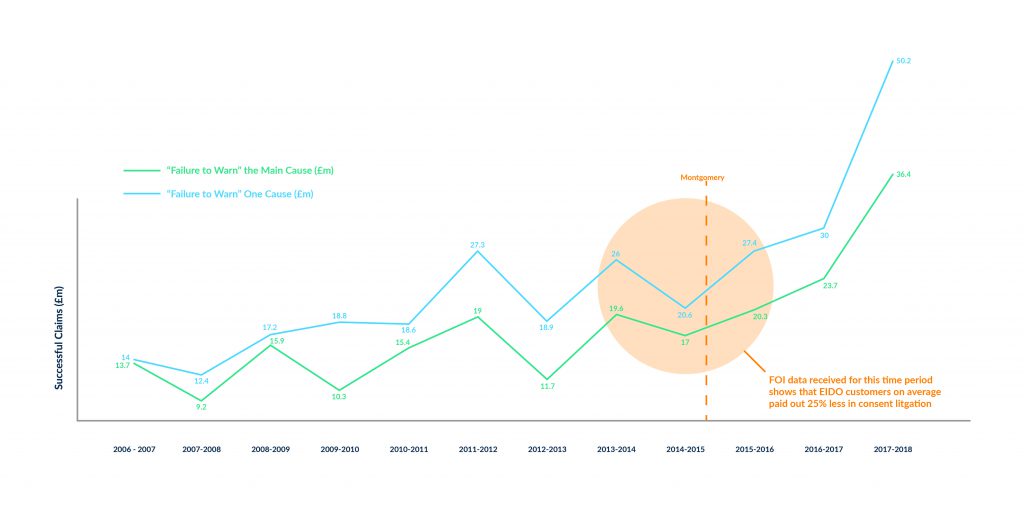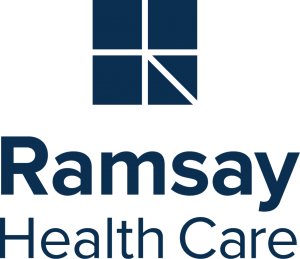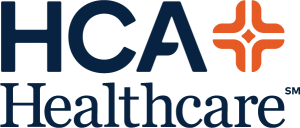Malpractice claims are a distressing time for patients and clinicians, as it can result in drawn-out and exhausting court cases. Such cases are a waste of time and money, negatively impacting all parties involved. Consent related claims should be the easiest to avoid yet are still very prevalent in today’s society. Failure to properly supply a patient with clear and relevant information before their procedure is negligent and can lead to consent-related litigation. Daniele Bryden and Ian Storey detail the stages necessary to a malpractice claim:
- A person is owed a duty of care.
- A breach if that duty of care is established.
- As a direct result of that breach, legally recognised harm has been caused. [1]
Data obtained by Freedom of Information requests, has found that in ten years, consent-related litigation costs for “failure to warn” have risen by 295%. This kind of litigation can be avoided, and EIDO is able to assist in that regard. With nearly two decades of experience, we’re well-equipped to aid practitioners to avoid litigation related to informed consent.

What this means for patients
Some specialties experience higher amounts of litigation, increasing the insurance premiums for surgeons that practice in these specialties. Notable specialties include gynaecology (dealing with problems and diseases effecting women), and obstetrics (concerning childbirth and midwifery). In countries such as South Africa, the insurance is so high that surgeons are choosing to avoid those specialties, and this is causing a problem.
Litigation and healthcare
It’s not just mistakes in the present or future which are a cause for concern. Laws in South Africa allow practitioners to be haunted by cries of negligence from as long as 19 years ago. [2] A study conducted in England found that 75% of senior obstetricians and gynaecologists in the North Thames (West) region had been involved in litigation. [3] The high risk of litigation has led to an increase in doctors who specialise in areas such as obstetrics and gynaecology into taking early retirement or reverting to a different specialty.
Changing attitudes to informed consent
These days, there is undoubtedly a greater awareness of the need for effective and honest informed consent. Emerita Professor of Law at Cardiff University Vivienne Harpwood explains the shift in attitudes which has led to this increased awareness.
‘The decision of the Supreme Court in Montgomery v Lanarkshire Health Board [2015] has given informed consent to treatment a higher profile. This reflects changing social attitudes and government policies, which recognise the right of individuals to make decisions about what happens to their bodies […] Consent is an ongoing procedure which should involve a dialogue and joint decision between clinician and patient.’
Vivienne Harpwood: EIDO’s 3rd Annual Consent Review
Author of several books concerning medical law, among Vivienne’s publications include several editions of EIDO’s Annual Consent Review. They contain an analysis of notable court cases in the wake of the Montgomery ruling, and their role in shaping the laws surrounding informed consent. The Annual Consent Review provides its readers with learnings from recent court rulings, which is useful in making sure the consent clinicians are obtaining from each patient is properly informed.
Technology provides the solution
In order to avoid accusations of malpractice, there needs to be a better way of keeping track of the information patients receive and clear signs that they have understood it. In light of this, we’ve developed a collection of digital products which provide the patient with reliable information about their proposed treatment, and a record of this. This includes details of all the benefits, alternatives and complications of their procedure, ensuring their decision is fully informed.
Our most recent product, EIDO Vault, tracks patient interaction and understanding, and the patient can only give consent after acknowledging they have understood the information provided. New technologies hold the potential to improve doctor/patient communication, strengthen patient understanding and revolutionise the consent process.
EIDO Healthcare leading the way
In the five years since Montgomery, consent litigation costs for “failure to warn” have more than doubled. The biggest change trusts can make now to reduce informed consent litigation is to provide clear, procedure-specific information. This information is used to inform the patient so valid consent can be taken.
‘Freedom of Information’ data gathered post-Montgomery found that, on average, trusts that use EIDO’s library of documents paid out 25% less on consent related litigation than those who don’t use our library. Consisting of nearly 400 procedure-specific patient education documents, our library provides practitioners with the necessary tools to provide the best care to their patients and reduce the possibility of consent-related litigation.

To find out more about our digital product Vault, which aims to help clinicians properly consent patients, please follow the link.
A copy of our free Annual Consent Review (now in its 3rd edition) be emailed directly to you using the form on our website homepage.
[1] Bryden, D. Storey, I. (2011). ‘Duty of care and medical negligence’, Continuing Education in Anaesthesia Critical Care & Pain. 11 (4), pp. 124-127.
[2] Van Dyke, J. (2017) ‘Dozens of gynaecologists are expected to shut down this year. This could stop that’, Bhekisisa: Centre for Health Journalism, (https://bhekisisa.org/article/2017-07-10-00-could-mediation-cure-south-africas-medico-legal-woes/?fbclid=IwAR1MAVot6EWNSrYsNwKgHFWB6WX_XseEQ0KNzEKn76d8EWIDDKdIajoWLHE).
[3] Vincent, C. Bark, P. Jones, A. Olivieri, L. (1994) ‘The impact of litigation on obstetricians and gynaecologists’, Journal of Obstetrics and Gynaecology. 14 (6), pp. 381-387.











